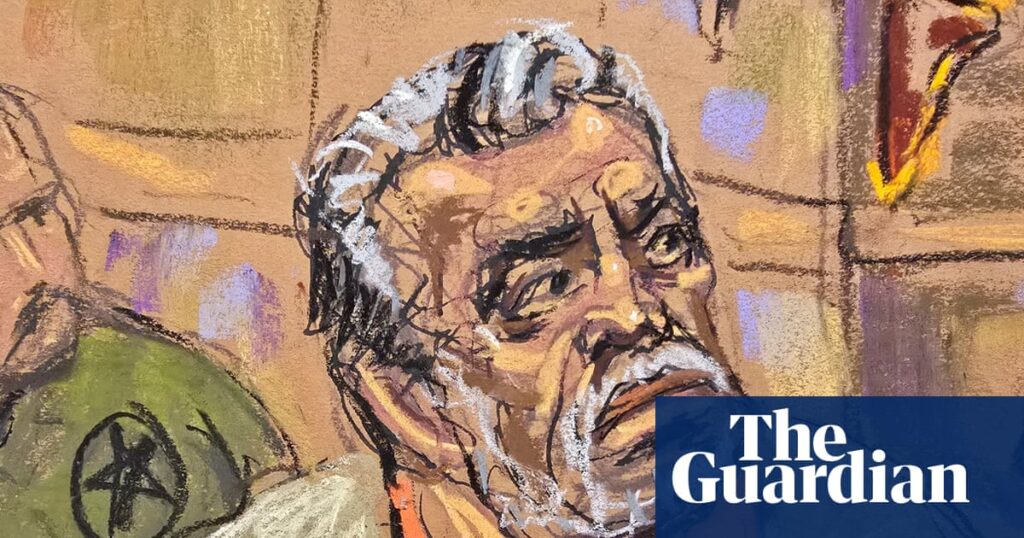The Mexican drug lord Ismael “El Mayo” Zambada, co-founder of the Sinaloa cartel, pleaded guilty to federal racketeering charges as well as running a criminal enterprise on Monday, more than a year since he was arrested in Texas after what has been described as a kidnapping.
“I recognize the great harm illegal drugs have done to the people in the United States and Mexico,” the 77-year-old Zambada said in court through a Spanish-language interpreter. “I apologize for all of it, and I take responsibility for my actions.”
Zambada helped form the feared Sinaloa cartel in the late 1980s and, at the height of the criminal operation, had controlled much of the production and shipment of heroin, methamphetamine and fentanyl from Mexico into the US.
The trafficker was arrested in July 2024 when he arrived in the US on a plane with Joaquín Guzmán López, the son of the imprisoned Sinaloa boss Joaquín “El Chapo” Guzmán, who is considered a “principal leader of the Sinaloa cartel” by US authorities and is currently serving a life sentence in an American prison.
The US claimed that Zambada presided over a violent, highly militarized cartel with a private security force armed with powerful weapons and a cadre of “sicarios”, or hitmen, that carried out assassinations, kidnappings and torture.
Prosecutors said that under the leadership of Guzmán and Zambada, the Sinaloa cartel developed into the largest drug-trafficking organization in the world, controlling the movement of tons of cocaine from Colombia to the US, heroin from Mexico’s mountain states, and later fentanyl produced from Chinese precursor chemicals.
A former associate of the Juárez cartel, Zambada operated within an area of Mexico known as the Golden Triangle, encompassed by the states of Sinaloa, Durango and Chihuahua. He started his career as a farmer, freelancer and small-time drug trafficker, moving small quantities of marijuana and heroin. As a logistics expert, he helped expand the Sinaloa cartel’s operations.
As with Guzman, the drug trade became a family business: Zambada’s wife, four sons and four daughters were at one time all involved in drug-trafficking logistics. In 2019, a son, Vicente Zambada Niebla, testified “that his father’s bribery budget was often as much as $1m per month, with bribes going to many high-level Mexican public officials”.
Zambada’s plea deal comes two weeks after federal prosecutors in New York said they would not seek the death penalty. Zambada’s lawyer, Frank Perez, told NBC News that the decision “marks an important step toward achieving a fair and just resolution”.
After Zambada was arrested, US officials claimed that he had not willingly traveled to the US but had been tricked by Guzmán’s sons, who had also turned themselves over to American authorities, to procure more favorable treatment.
Zambada wrote soon after his arrest there were “many inaccurate reports” and wanted everyone to know from the outset he did not surrender to US authorities, have an agreement or come voluntarily.
“To the contrary, I was kidnapped and brought to the US forcibly and against my will,” he wrote.
Zambada petitioned the Mexican government to request extradition to the country. And Mexico said it was investigating anyone involved in handing over a Mexican citizen to foreign agents as a treasonable offense.
The drug lord’s plea deal comes as Donald Trump’s administration is applying pressure on Mexico to crack down on the cartels and is reportedly planning to begin using military force against the organizations, including the Sinaloa organization, which the US government deems to be terrorist groups.
Earlier in August , the New York Times reported that Trump had issued a directive to the Pentagon to begin using military force to curb the flow of narcotics in the US, a task typically assigned to law enforcement agencies.
Zambada’s plea deal comes as Guzmán, his former Sinaloa partner, recently filed a federal complaint alleging that he faces cruel and unusual conditions of confinement inside the SuperMax federal prison in Florence, Colorado, where he is being held.
Human rights attorneys for Guzmán said their client suffered from “near-constant severe sinus, ear, nose, and throat pain for years without adequate medical care” and has experienced “severe sleep deprivation for years due to the conditions of confinement in his cell”.
The filing claims Guzmán is kept in “all-encompassing isolation” that amounts to unconstitutional cruel and unusual punishment. And the filing maintains Guzmán will suffer “irreparable harm” as a result of the “unconstitutional isolation”.
El Chapo’s attorney David Lane told Denver 7 that Guzmán was alleging “he is in complete and total isolation with virtually no human contact of any kind”.
“He only speaks Spanish, and even the Spanish-speaking guards are instructed not to interact with him or talk with him,” Lane said. “So this is complete isolation from any human contact.
“It’s government control … The most dangerous entity on Earth is a government that’s unchecked and can do whatever it wants. We are here to defend [Guzmán] against the government and protect all of our fundamental rights.”


